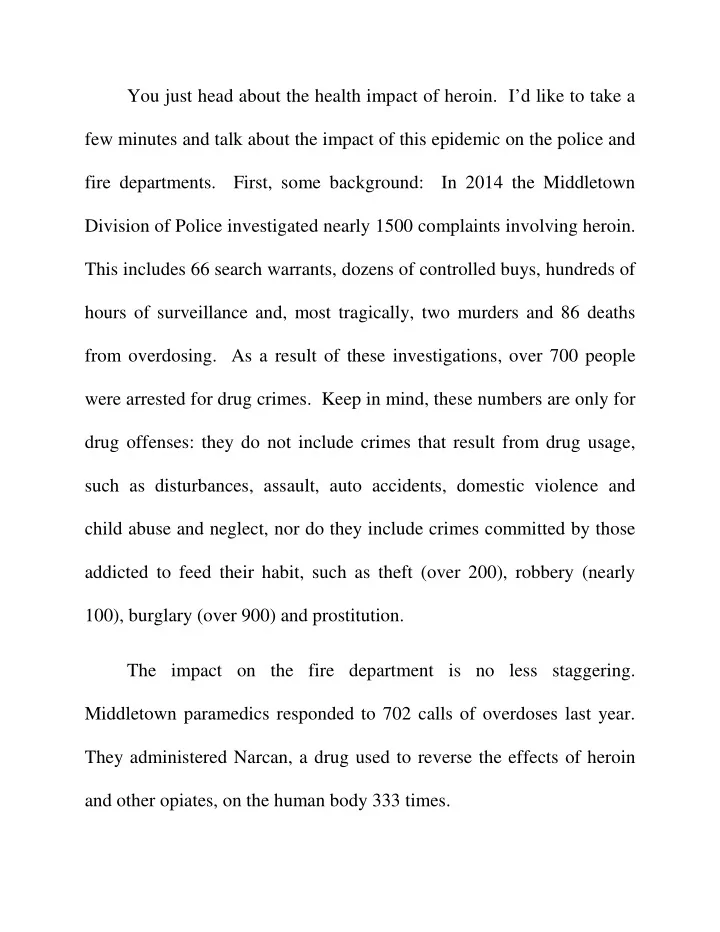

You just head about the health impact of heroin. I’d like to take a few minutes and talk about the impact of this epidemic on the police and fire departments. First, some background: In 2014 the Middletown Division of Police investigated nearly 1500 complaints involving heroin. This includes 66 search warrants, dozens of controlled buys, hundreds of hours of surveillance and, most tragically, two murders and 86 deaths from overdosing. As a result of these investigations, over 700 people were arrested for drug crimes. Keep in mind, these numbers are only for drug offenses: they do not include crimes that result from drug usage, such as disturbances, assault, auto accidents, domestic violence and child abuse and neglect, nor do they include crimes committed by those addicted to feed their habit, such as theft (over 200), robbery (nearly 100), burglary (over 900) and prostitution. The impact on the fire department is no less staggering. Middletown paramedics responded to 702 calls of overdoses last year. They administered Narcan, a drug used to reverse the effects of heroin and other opiates, on the human body 333 times.
The impact of heroin on the public safety forces can be measured in a number of ways. I’m going to discuss two of them – the drain on personnel services, and the financial cost. In the police department, the initial call of a drug complaint typically takes about an hour of a patrol officer’s time, search warrants consume at least 15 hours of time for the Special Operations unit, and arrests add another hour of time. This alone is over 3,000 man-hours spent on drug crimes. Add to this figure the time spent processing reports, the hours spent testifying in court and the time consumed by housing, feeding and caring for those arrested, and the number quickly skyrockets. From the fire perspective, they too spent over 3000 man-hours on calls directly related to heroin. This is time that police officers and fire fighters could be doing other, more productive, things. Police officers, for example, investigating other crimes or engaging in crime suppression, community policing and other proactive activities, while fire personnel could be responding to other emergencies and relying less on mutual aid. Never before has Middletown faced an epidemic of this nature, and it comes at a time when both the Police and Fire divisions are experiencing their lowest
staffing levels in 30 years. This reduced staffing further aggravates the issue, as fewer police and fire personnel are available to meet this increased demand for service: on-the-job injuries have increased in the fire department, for example, and both police and fire personnel pay an enormous psychological toll as they try to address this tragedy through conventional means, only to see the same people engage in this senseless, self-destructive behavior. On more than one occasion we have seen the same person overdose two days in a row. Measured in financial terms, the cost to the taxpayer through police efforts alone is over $1.2 million dollars, while the fire and EMS costs are over $175,000. This includes the hours spent investigating, arresting, housing, transporting and treating those afflicted with heroin addiction. Additionally, the Municipal Court has spent over $112,000 in criminal and civil cases involving heroin and the Health Department has spent over $18,000 in indigent burials. This puts the direct cost of heroin to the City of Middletown at over 1.5 million dollars.
I’ve talked for a few minutes about what we saw last year. This year is not looking much better. The very first report of 2015, which came in at 6 minutes after midnight on New Year’s Day, was a call of an overdose. Paramedics were able to save that individual, a Hamilton resident; however as of January 20 th of this year five other citizens of Middletown were not so fortunate and have died from an overdose. We continue to spend both time and taxpayer money on this problem: 40% of the overtime spent in the Detective section alone so far has been spent on overdose death investigations. I met with the Butler County Coroner, Dr. Mannix on the 22 nd of this month. She advised that already this year there has been 21 overdose deaths in Butler County. So basically everyday someone in Butler County died from a drug overdose. She further stated that in 2014, overdose deaths (140) surpassed deaths by natural causes. What we are doing to address this problem is not working. We need to come together as a community, focus on this issue, and find a more effective solution.
Recommend
More recommend